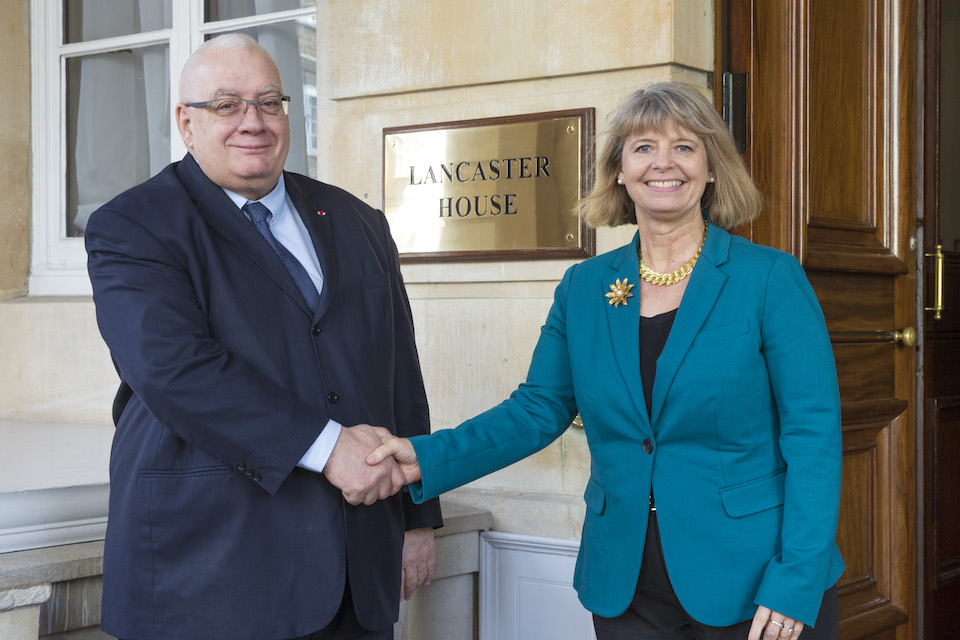BAE Systems announced today that the new training facility will provide a tailored learning environment for an estimated 1,000 craft and technical apprentices currently in training.
Mr Fallon met apprentices working in a range of areas, and toured the Devonshire Dock Hall where Audacious, Anson and Agamemnon, the fourth, fifth and sixth of seven Astute class nuclear-powered submarines, are under construction.
Defence Secretary Sir Michael Fallon said:
This investment demonstrates the benefits that our growing defence budget brings for highly skilled jobs in the North West and across the country.
It will ensure we have people with the skills necessary to deliver one of the most complex programmes in the world that will help modernise our fleet of nuclear submarines.
Apprentices at BAE Systems already work on our cutting-edge Astute Submarines, the most powerful attack submarines ever operated by the Royal Navy, as well the Dreadnought Programme, the new fleet of four Dreadnought Ballistic Missile submarines that will carry our nuclear deterrent.
The new modern facility is due to open next year and will include a teaching block, classrooms, offices, craft workshops and welfare facilities. It is planned that the facility will include to-scale ‘submarine mock-up sections’ which will allow apprentices to gain hands-on experience in a controlled environment and help them develop skills working to the tolerances required to build submarines.
Following a £1.3 billion investment by Defence, construction has started on the Dreadnought submarines. Backed by a rising Defence budget and £178 billion equipment programme, both Astute and Dreadnought programmes secure thousands of highly skilled jobs in Barrow and right across the UK.
Tony Johns, Managing Director of BAE Systems Submarines, said:
The design and build of a nuclear-powered submarine is one of the world’s most complex and technically demanding engineering challenges. It’s vital we have right people with the right skills to deliver these programmes and this investment underlines our commitment to the future. The new facility will provide a modern learning environment to supplement the training our apprentices already receive.
The MOD is committed to delivering more high quality apprenticeships and work experience for young people right across Defence, and encouraging our industry partners to do the same. As the largest provider of apprenticeships in the UK, the MOD successfully completes more than 10,000 apprenticeships a year and we are setting a target to deliver 50,000 military apprenticeships during this parliament.
Whilst in Barrow, the Secretary of State also visited Allan Webb Ltd, a specialist in Defence Technical Documentation and Supportability Engineering to review aspects of the support provided to the MOD. Allan Webb Ltd has a strong reputation in the Defence Sector for quality and innovation having over 50 years’ experience in the industry.
Allan Webb Ltd works in conjunction with BMT Defence Services, to increase the MOD’s capability with training and logistical support. BMT Defence Services has a strong reputation in the naval design market, having provided the winning designs for Royal Navy’s MARS Fleet Tanker, the Queen Elizabeth Class (QEC) aircraft carrier, and the Astute submarine
The Defence Secretary, Sir Michael Fallon said:
Allan Webb Ltd and BMT Defence Services operate a strong and efficient partnership that provides the MOD with world-leading service helping us to keep Britain safe.
During his visit, the Defence Secretary discussed the latest innovations in how technical equipment handbooks are produced for the MOD and the benefits of this modernisation in order to meet the needs of engineers across the Armed Forces.
Our work with companies of all sizes shows Defence’s determination to do its part to deliver a bold, long term Industrial Strategy that builds on our strengths and prepares the UK for the years ahead. We are working with SMEs and businesses of all kinds to innovate and build mutual security to ensure an economy that works for everyone.
Defence investment supports high-wage, high-skills jobs across the UK and backed by our rising Defence budget, £178bn Equipment Plan, and £800m Innovation Initiative, we are delivering the jobs, apprenticeships, infrastructure, and economy of the future.
- You can find out more about Continuous At Sea Deterrence here.
- You can find out more about MOD Apprenticeships here.

